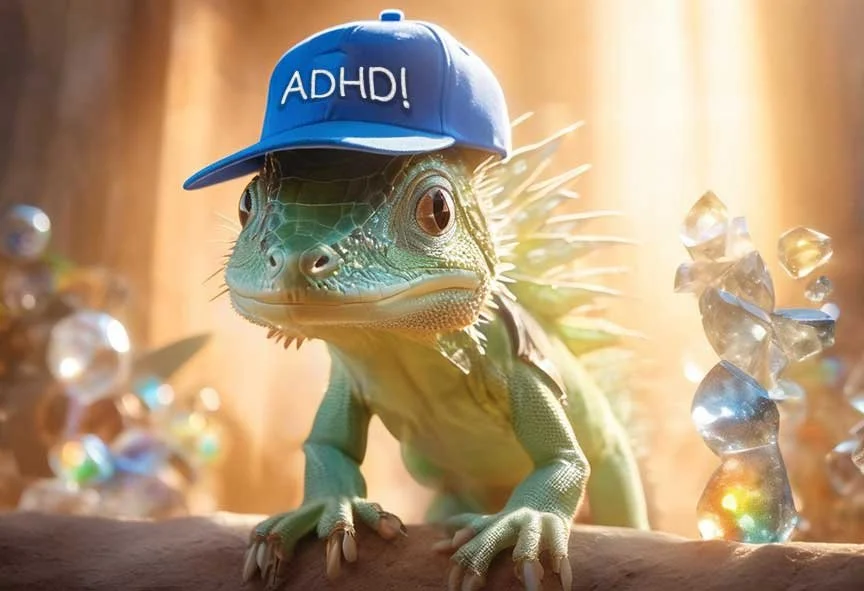Mastering the Clock: Time Management Hacks for Adults with ADHD
Do you ever feel like time is slipping through your fingers, leaving you overwhelmed and behind? As an adult with ADHD myself, this struggle is all too familiar. Mastering time management isn’t just a distant dream—it’s achievable with the right approach. The one that works for you! This post, written by a fellow ADHDer and Coach, offers actionable strategies to help you regain control of your time!
Topics Covered
Common Challenges of Time Management with ADHD
Effective Time Management Strategies
The Power of Accepting your Weaknesses
The Role of ADHD Coaching in Time Management
Sometimes we can feel pretty small against time. (Don't look too closely at the clock.)
What Are the Common Challenges of Time Management with ADHD?
Managing time is a critical life skill that affects everything from professional success to personal well-being both physically and mentally. However, those of us with ADHD often face unique and possibly hard to understand, difficulties keeping track of time. ADHD affects our executive function skills which are responsible for organizing, prioritizing, and completing tasks. Within all that one must be keeping track of time. Hence, why we are often perceived, sometimes very correctly, as just “bad at time.”
This can lead to disorganization, procrastination, and difficulty in estimating how long tasks will take. Sometimes, if not lots of time, we just plain forget or get distracted when only a second ago we were very aware of the time and our commitments. It all can be maddening!
The Emotional Toll of Poor Time Management
Beyond the logistical challenges, poor time management can take a significant emotional toll on individuals with ADHD. Constantly missing deadlines, running late, or feeling overwhelmed can lead to feelings of frustration, guilt, and diminished self-esteem. And don’t get me started on the anxiety! Over time, this can lead to poor job performance, possibly being fired from multiple jobs, or even losing out on relationships with friends and partners.
ADHD Coach Perspective: I’ve worked with many people on the spectrum during my career in the video game industry. Despite being some of the most intelligent, empathetic, and hard working people I’ve known they often struggled with time management. As a Lead and Producer I regularly had to intervene on behalf of my co-workers to keep them from taking on too much work. A key problem was their ability to estimate how long tasks typically took them. When not kept in check this behavior would lead to late nights, missed deadlines, and an overwhelming sense of anxiety. (And I am certainly very guilty of this myself! Check out this blog post where I explain how my undiagnosed ADHD deeply affected by work ethic and self-image.)
What Are Effective Time Management Strategies for Adults with ADHD?
While ADHD can make time management more challenging, it is far from impossible. With the right strategies, tools, and desire you can gain control over your time and improve your daily productivity. The key here is to create a support system outside your brain that does the job it’s not so great at. Think of this as “backup for your brain!”
If that concept is hard to take in it may be that you relate your sense of self to your body. Let me make this very clear. YOU ARE NOT YOUR ADHD. YOUR ADHD IS A PART OF YOUR BODY. YOU ARE THE VIBRANT YOU THAT RESIDES WITHIN IT.
Let’s explore some practical tips designed to address the specific needs of adults with ADHD.
1. Establish Consistent Routines
One of the most effective ways to manage time with ADHD is by establishing and maintaining consistent routines. (This can also be the most difficult item on this list! So don’t worry if you’re struggling at it. It slowly can happen.) Routines provide structure and predictability, which can help reduce the mental load of constantly making decisions about what to do next. Plus, sometimes the routines will help manage you as they come up. My sessions with my clients are self-imposed routines that require me to get up and get my day going. I’ve created my own accountability structures while doing something I love!
Start with small, manageable routines, such as a morning routine that includes time for breakfast, a few minutes of mindfulness, and reviewing your day’s tasks. If you struggle to remember this then maybe try writing it down like a list and put it somewhere you will stand in front of it in the morning. If, over time, you stop becoming aware of the list then move it to a new place or remake it. Possibly with rainbows and glitter and shit.
The Power of Morning Routines
A morning routine can set a positive tone for the rest of the day. By starting your day with a consistent set of activities, you can create a sense of stability and focus that carries through to your work. This approach can also help you transition more smoothly from one activity to the next, reducing the chances of getting derailed by distractions.
2. Break Tasks into Smaller Steps
One of the reasons time management is so challenging for adults with ADHD is the tendency to feel overwhelmed by large tasks. Breaking tasks down into smaller, more manageable steps can make them seem less daunting and easier to tackle. Use the Pomodoro Technique, which involves working for 25 minutes followed by a 5-minute break. This method helps maintain focus and provides regular intervals for your brain to rest and recharge.
ADHD Coach Insight on Taking Breaks: You likely have your own version of the Pomodoro Method. Our brains fatigue more quickly than neurotypical ones, requiring more frequent breaks to maintain concentration. You might take breaks during intense tasks, but not at regular intervals or before fatigue peaks. The Pomodoro Method helps you create breaks just before you need them to avoid possible energy swings.
Use a timer during focused tasks to see how long you work before needing a break. You might find you're standing up for a break without realizing it! How can tracking your work and break times enhance your well-being? What’s an optimal work duration for you before a break, and does it vary by task?
I don't know about other ADHDers but I certainly feel pretty slow in the morning.
3. Utilize Visual Timers and Alarms
Visual timers are incredibly effective tools for managing time with ADHD. These devices provide a clear visual representation of time passing, which can help keep you on track. Set alarms for specific tasks or transitions throughout the day. These reminders can serve as checkpoints to ensure you’re staying on schedule and not losing track of time.
I know you’re probably thinking of “big things” to track like hours studying or making sure you leave the house in time for work. What very small tasks could you also use a timer for? Pot of boiling water? Not forgetting the clothes in the dryer? Or what about how long to steam broccoli for? Timers are great ways to catch us when we become distracted or forgetful. And no one likes squishy broccoli right? Right? (Maybe there’s people out there who like soft broccoli. Eew!)
How Visual Timers Can Transform Your Day
Using visual timers can be particularly helpful for tasks that require sustained focus, such as work projects or studying. By giving you a visual cue of how much time has passed and how much remains, these timers can help reduce the likelihood of drifting into distractions.
4. Prioritize Your To-Do List
Not all tasks are of equal importance. Prioritizing your to-do list ensures that you focus on what truly matters. Unfortunately we can really struggle to do this and can become overwhelmed and non-functional in the process. Start by not prioritizing things. Just write them all down in whatever order they come out. Then look at the list and identify which ones feel super important by looking for emotions that come up. Often times the items that stand out will create some stress or anxiety. Shoot for about 3 items you’ll focus on first. Completing these first can provide a sense of accomplishment and reduce the pressure to finish everything at once. Consider using task management apps like Todoist or Trello to keep your list organized and help you stay on track. (I personally used Trello as a Producer and loved it!) In the end just use what works for you. There's no “right way” to do this.
FOCUS ON IMPROVING YOUR ABILITY TO GET THINGS DONE. HOW WILL SHOW UP ALONG THE WAY.
5. Create a Focused Environment
Distractions are a major obstacle to effective time management, especially for those with ADHD. Creating a focused environment can significantly improve your productivity. Set up a dedicated workspace that minimizes distractions, such as a quiet room or a corner of your home with minimal noise and visual clutter. Use tools like noise-canceling headphones or website blockers like Freedom to keep distractions at bay.
Real-Life Example: The Cone of Silence at Electronic Arts
We had a literal, big, bright orange road construction cone at Electronic Arts, on several teams, that said “Cone of Silence” on it. If anyone on the team was under the gun and needed to get work done they would put this cone in the entryway to their cubicle. It typically had a piece of paper taped to it with that person’s manager’s name on it if you needed to ask questions. It was a brilliant strategy that worked well while being fun! Can you imagine using something like that? Maybe your “cone of silence” note says “Go ask Dad.”
What strategy could you come up with that would be fun and effective?
The Power of Accepting Your Weaknesses
ACCEPTING our weaknesses is generally not fun in the beginning. Most of the time it’s down right uncomfortable and all the way to gut wrenching. The AWARENESS that you have a neurological disorder can make you feel “broken, not good enough,” or even “retarded.” Yes I used the R word! All of these labels were states of belief I went through at different moments after my self-diagnosis. Often it was in relation to my fears of not being able to take care of my family or be the man I or my wanted and needed? Those evenings crying, sometimes in my wife’s arms, were some of the most painful parts of my growth through my ADHD. They were necessary states I had to go through because on the other side of all that pain was an open space of choice and possibility. What was I going to do about this?
My ACCEPTANCE of my ADHD allowed me to start working with it and figure out how to mitigate my weaknesses. My ADHD brain is a big reason for my successes. Becoming interested in learning about ADHD and the challenge to do so motivated me to be a Coach. Several years later and I’m still going with all that ADHD!
Once you ACCEPT the fallibility of your brain you can start putting into place strategies to reduce your anxiety and overwhelm. I stopped saying, “I’ll remember” a long time ago. Now I write things down, set reminders, or even write on my hand knowing I could totally forget at any moment. (I do this sort of stuff all day long!) Doing so greatly reduced my mistakes and my anxiety because I had “backup” in place.
Do you still believe you will remember or won’t forget despite reality saying otherwise? What is one thing you could do right now to create backup for your brain? How would you feel knowing you have backup in place for something you may often struggle with?
“If you were born with the weakness to fall you were born with the strength to rise” – Rupi Kaur
How Can ADHD Coaching Improve Time Management?
ADHD coaching can be a powerful tool in developing time management skills. A coach works with you to create personalized strategies tailored to your unique challenges and strengths. They provide accountability, helping you stay committed to your goals and adjust your strategies as needed. An ADHD coach can also offer valuable insights into overcoming procrastination, managing distractions, and building effective routines.
The Role of Accountability in Time Management
One of the key benefits of working with an ADHD coach is the accountability they provide. Regular check-ins with your coach can help you stay on track and make adjustments to your strategies as needed. This partnership fosters a sense of responsibility and motivation, which are essential for developing and sustaining new habits. Coaches also help their client reframe their limiting beliefs. This is one of my favorite parts of coaching because it’s like dropping a little “epiphany bomb” into the conversation. Watching my clients eyes widen, or suddenly become very pensive, or simply state, “Whoah! That was a good question!” makes my days.
What changes would you like to see in your own life and how might you feel if they happened?
YOU HAVE THE POWER TO CHANGE YOUR LIFE EVERY SECOND OF EVERY DAY.
Conclusion
Time management is a critical skill that can greatly enhance your productivity and reduce stress, especially for working professionals with ADHD. It can actually be done BTW! We ADHDers face some unique challenges in lots of small but significant ways. Our struggles to keep track of time and what we are doing within it are very real and should not be overlooked. Accepting this struggle is the first step one must take in order to do something about it. Within this process is great strength to see and overcome one’s own struggles. Utilizing the strategies in this post can literally remake your world into one with less anxiety, less overwhelm, and more joy. It takes time however but I promise you the rewards are worth it! So what are you waiting for? Make that list, create that routine, set that alarm clock, buy that digital watch, use that app! The future is yours if you’re willing to take it!
References and Additional Reading:
ADHD Minds Are Trapped in Now (& Other Time Management Truths) - I love this article over on ADDitude explaining how to better “see” time.
11 tips for ADHD time management for adults - More tips!
How Does ADHD Affect Your Time Perception? - This goes over a quick summary of how we struggle to perceive time.








